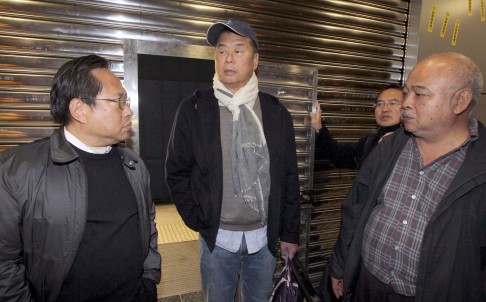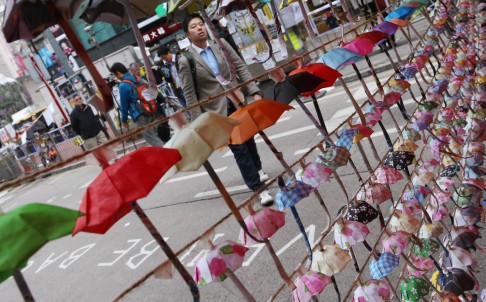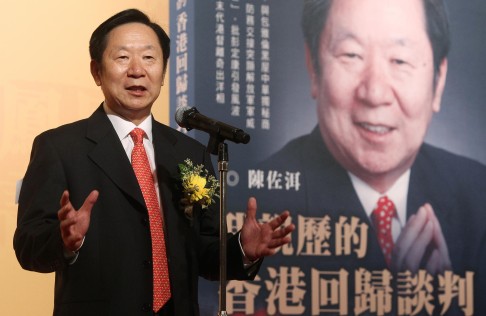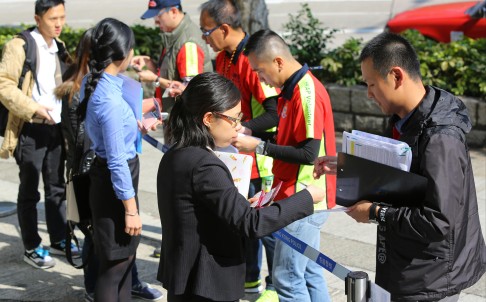Occupy Central
Occupy Central is a civil disobedience movement which began in Hong Kong on September 28, 2014. It calls on thousands of protesters to block roads and paralyse Hong Kong's financial district if the Beijing and Hong Kong governments do not agree to implement universal suffrage for the chief executive election in 2017 and the Legislative Council elections in 2020 according to "international standards." The movement was initiated by Benny Tai Yiu-ting (戴耀廷), an associate professor of law at the University of Hong Kong, in January 2013.
Umbrella Movement
The Umbrella Movement (Chinese: 雨傘運動; pinyin: yǔsǎn yùndòng) is a loose political movement that was created spontaneously during the Hong Kong protests of 2014. Its name derives from the recognition of the umbrella as a symbol of defiance and resistance against the Hong Kong government, and the united grass-roots objection to the decision of the Standing Committee of the National People's Congress (NPCSC) of 31 August.
The movement consists of individuals numbering in the tens of thousands who participated in the protests that began on 28 September 2014, although Scholarism, the Hong Kong Federation of Students, Occupy Central with Love and Peace, groups are principally driving the demands for the rescission of the NPCSC decision.
The movement consists of individuals numbering in the tens of thousands who participated in the protests that began on 28 September 2014, although Scholarism, the Hong Kong Federation of Students, Occupy Central with Love and Peace, groups are principally driving the demands for the rescission of the NPCSC decision.
OCCUPY CENTRAL - DAY 77: Full coverage of the day’s events
Arrested Hong Kong activists released as pro-democracy protests continue
PUBLISHED : Saturday, 13 December, 2014, 1:01am
(From left) Albert Ho, Next Media's Jimmy Lai, Lee Wing-tat and Tsang Kin-sing after their release yesterday. Photo: SCMP
All protesters arrested on the last day of the Occupy camp in Admiralty were released yesterday morning, the day after the clearance, with most of them refusing bail.
But the protests continued last night, as democracy supporters staged a "shopping" trip to Causeway Bay, where a bizarre stand-off saw police raise yellow warning flags as protesters dressed in choir garb sang carols and waved banners outside Times Square.
A crowd of about 200 gathered for the impromptu concert, some raising yellow umbrellas as police raised a sign telling people to disperse. The crowd later broke up without arrests. Similar "shopping" trips, in which crowds walk slowly to disrupt commercial areas, have been held in Mong Kok since the protest camp there was dispersed.
Earlier in the day, 249 people arrested in Admiralty on charges of unlawful assembly and obstructing police were released unconditionally, according to barrister Alvin Yeung Ngok-kiu.
"I would say that the majority of them refused bail," said Yeung, a member of a team of pro-bono lawyers offering advice to people arrested during the 21/2 month democracy campaign. Among those released were media mogul Jimmy Lai Chee-ying and pop star Denise Ho Wan-sze, who both refused bail. A record 15 lawmakers were also arrested.
Suspects who refuse bail must be charged or released without conditions. Police can still prosecute them later.
Meanwhile, Scholarism convenor Joshua Wong Chi-fung responded to criticism by New People's Party chairwoman Regina Ip Lau Suk-yee, who had singled Wong out for not allowing himself to be arrested during the Admiralty clearance.
Wong, on bail after being charged with contempt of court, had said he wanted to avoid being detained until his next court hearing on January 14, but Ip asked on social media: "Why did he not stay with his comrades? ... This is against the principle of civil disobedience."
Asked to respond to Ip's criticism on RTHK yesterday, Wong said: "If I was to turn my back on my comrades, why would I go to the police station last night? It is impossible for everyone to be on the front line, leaving no one to play the coordination role."
Tommy Cheung Sau-yin of the Federation of Students added that more activists were now deployed to do backstage work, because they learned a lesson from the arrests of 511 people in the sit-in in Central on July 2.
"It wasn't very smooth [on July 2] ... We had to track where each vehicle went. This time, those arrested were even taken to different police stations," he said.
Wong and Lester Shum from the federation had expressed anguish over not being able to be arrested with their comrades, in interviews before the clearance of the Admiralty protest site.
"It was really tough not being on the front line with everyone," said Shum. He also urged supporters to continue to seek genuine democracy, adding that Hong Kong was now a permanent home, not a refugee community.
"Having a home means having choices and rights there," he said. "We agree that it's one country, two systems, but remember that sovereignty is with the central government, governance is with Hong Kong."
Additional reporting by Emily Tsang
This article appeared in the South China Morning Post print edition as All protesters released as 'shopping' trips continue
Hong Kong police to clear final protest zone on Monday: source
PUBLISHED : Saturday, 13 December, 2014, 1:01am
Paper umbrellas hang in Causeway Bay - for now at least. Photo: K.Y. Cheng
Hundreds of police officers will clear the final Occupy Central protest zone in Causeway Bay on Monday morning, a police source says.
The clearance would begin after 9am and those who refused to leave the site in Yee Wo Street would face arrest for unlawful assembly and for obstructing police, the source said.
"We will give warnings and enough time to illegal occupiers to collect their belongings and leave the sites before our officers move in," the source said.
Police are understood to be planning a press conference to appeal to the pro-democracy protesters to leave their site, close to the Sogo department store.
And the source said a strong police presence would remain in Causeway Bay, as well as the already-cleared Mong Kok and Admiralty sites, to head off any attempt at a new occupation.
But the dozens of protesters who remained in Causeway Bay yesterday vowed to stay in place until the clearance.
"We want to show the public why we are here and that we are fighting for democracy," said one protester, Ken Chung.
Meanwhile, the hum of traffic returned to Admiralty yesterday, a day after police cleared the bulk of the protest zone. A few cleaners continued to clear the remaining fragments of posters from the walls.
But about 50 tents remained in place outside the adjacent Legislative Council building, covering an official protest area, a roundabout and an outdoor plaza.
Lawmakers will hold a special meeting on Monday to decide the way ahead should the protesters stay in place. But one protester, construction worker Terry Chick, 44, said protesters had agreed with a member of Legco security staff on Thursday night that they would leave at noon today.
The police source said they would not clear this area unless violence broke out.
Meanwhile, a police officer who passed out during Thursday's clearance operation in Admiralty remained in a critical condition last night. Sergeant Tam Kwok-lun, 49, complained of feeling unwell during the operation and boarded a coach to rest. He was later found unconscious in the vehicle and was admitted to Ruttonjee Hospital in Wan Chai.
Now Hong Kong must face the big questions in wake of Occupy
The shouting is over and the talking must begin as the city confronts the big question of how to achieve electoral reform without confrontation
PUBLISHED : Saturday, 13 December, 2014, 1:01am
For two months, Hong Kong's politics have been dominated by whether, when or how the Admiralty occupation should end. With the camp gone, the city now faces the question at the crux of the debate: how should we reform our electoral system and prevent further confrontation?
Lawmakers and academics who spoke to the South China Morning Postwere generally pessimistic about the prospect of achieving universal suffrage for the election of the chief executive, as Beijing has made it clear that it will not back down.
On August 31, the National People's Congress ruled that Hong Kong could pick its leader by "one man, one vote" in 2017 - but only from a list of one or two candidates who had received the backing of at least half of a 1,200-strong nominating committee.
That decision was a trigger for the Occupy Central protests in September. Students, activists and citizens urged Beijing to scrap the ruling, saying it deprived them of a "genuine choice" of candidates.
They had hoped they could force authorities to give in, but with the clearance of the Admiralty base camp, some believe there is no more hope of a breakthrough in the 2017 constitutional reforms. And the chance of minor improvements to Beijing's framework could have also vanished, as the central government further toughens its stance.
A day before the Admiralty clearance, Chen Zuoer, the former deputy director of the Hong Kong and Macau Affairs Office, reiterated that he thought Occupy Central was Hong Kong's version of a "colour revolution", a reference to uprisings in post-Soviet states.
In an interview with the China News Service, Chen - now the head of the Chinese Association of Hong Kong and Macau Studies - called for a "rethink and planning on how to rule Hong Kong".
He stressed the need to understand the "three pairs of concepts that must not be treated as equals". Those three pairs, he said, were the "'one country, two systems', the nation's socialist core and [Hong Kong's] original capitalist systems, and the nation's sovereignty, safety and development interests and maintaining a region's prosperity and stability".
"The actual significance of the waves of struggle surrounding the power to rule is no less than that of the 1997 handover. [The former could be] even more complicated," he said.
Chen said the association's experts believed "Hong Kong people should be prepared for a possibly long-term struggle with the force that brings calamity to Hong Kong … in aspects such as the law court, Legco, mass media, universities or even secondary schools".
The vice-chairman of the Chinese Association of Hong Kong and Macau Studies said Beijing appeared to be toughening its stance towards Hong Kong.
Professor Lau Siu-kai said: "Beijing is also kind of shocked to see people [fighting for democracy] through illegal actions … and thus inclined towards [being more] conservative," he said.
Joseph Wong Wing-ping, former civil service minister and now a public affairs commentator, believed any chance of even minor improvements to the framework announced on August 31 had gone.
Democratic Party lawmaker Wu Chi-wai said that by suggesting that national interest was more important than regional prosperity, Chen was saying that "Beijing is no longer concerned about whether Hong Kong is governable".
But Zhang Dinghuai, deputy director of Shenzhen University's Centre for Basic Laws of Hong Kong and Macau, said Chen's remarks did not mean room for political reform was limited.
"Hong Kong is a special administrative region under the central government. How can it be possible that the central government does not have a say on Hong Kong's political development?" he asked.
Zhang said reforms could only move forward when rational discussion returned.
Some local academics also believe it is not too late to restart dialogue.
Joseph Chan Cho-wai helped train the students leaders ahead of their televised meeting with Chief Secretary Carrie Lam Cheng Yuet-ngor in October.
The political scientist professor at the University of Hong Kong said that pan-democrats should now start efforts to negotiate for open elections beyond that date. "It has been clear all along that there will be no concession [by Beijing] on constitutional reform … On the other hand, it is also impossible for pan-democrats to endorse the 2017 proposal under the current situation," he said.
But Chan believed there was still something that the Hong Kong government and the pan-democratic camp could do - mainly by making use of the "multiparty platform", which Lam has pledged to consider establishing, and inviting the Federation of Students and Scholarism to join.
Lau Siu-kai also called for Beijing, the Hong Kong government and the pan-democratic camp to start rebuilding their relationships.
"The local administration can try to minimise social confrontation in its rule," Lau said. "It can also adopt a more inclusive style of governance to mend ties, and roll out policies to alleviate social grievances."
Lau also urged the pan-democratic camp to "rethink" how they want to handle their relationship with the central government.
Additional Reporting by Peter So
This article appeared in the South China Morning Post print edition as So what happens now?
Police outline details of clearance of Causeway Bay Occupy site
Hundreds of officers to descend on vestiges of Causeway Bay protest site Monday morning
Potential police officers are interviewed during recruitment day yesterday at police HQ in Kowloon Bay. Photo: Edmond So
The last embers of the 2½-month Occupy Central campaign could be stubbed out tomorrow after police announced details of the clearance of the last protest site left standing.
The clearance of Causeway Bay will start soon after 9.30am and roads near the Yee Wo Street camp, including Jardine's Bazaar, Sugar Street and part of Gloucester Road, will be closed.
"If it goes smoothly, we hope the occupied roads could be reopened in the afternoon," said Steven Hui Chun-tak, chief superintendent of the police public relations branch.
It is understood that hundreds of police officers, rather than the thousands called up in Admiralty last week and Mong Kok last month, will be deployed. Hui urged protesters to leave voluntarily and said they would have little time to pack belongings when the clearance began.
Only a few dozen protesters remained at the site yesterday. Some assembled their own version of the "Lennon Wall", the landmark in the Admiralty camp where people left messages of support for the protests.
Amid warnings from Occupy co-founder Benny Tai Yiu-ting that frustrated protesters could turn more radical, Hui said more officers would be deployed to counter the latest protest tactic, so-called shopping trips.
The "shopping" exercises have sprung up since the Mong Kok clearance and see protesters stand or move slowly through crowded shopping areas. On Friday, protesters defied police warnings as they sang carols dressed in choir garb while holding pro-democracy banners at Times Square in Causeway Bay.
Yesterday, a government spokesman revealed that the organisers of the annual New Year countdown at Times Square had withdrawn their plan for this year's celebration. Hui said police had not been consulted on the matter.
Separately, images of clashes between "Asia's finest" and protesters seemed not to have put potential officers off a career in the force. The first recruitment day since the 75-day sit-in at Admiralty ended saw potential recruits crowd into Auxiliary Police Headquarters in Kowloon Bay.
A police spokesman said more than 1,500 applications were received yesterday for posts at various ranks, slightly up on the 1,400 received at last year's winter recruitment day.
For Lingnan University philosophy graduate Matthew Chan, 23, Occupy was one of the reasons that spurred him to join the force.
"There were some parts [in the movement that] the police didn't handle well. So even more so it's important to have people who want to work on those things to join the force," he said. "I think the rule of law is so important - it needs to be upheld."
Another potential recruit agreed that Occupy had not put her off policing.
"A city cannot be without the police and protective services," said the 28-year-old woman, who works in information technology. "Protective services are never a popular vocation - I'm not joining the force because it's a popular job."
Jeffrey Ho, 28, who graduated with a degree in forensic-science research in Australia, said he had always wanted to join the police.
He said officers needed to obey commands from their superiors or else "it wouldn't be a police force".
He said if he were in a situation where he thought orders were not appropriate, he would discuss it with his superiors and try to come up with a better way.
A police spokesman said the force expected to meet its target of recruiting 230 probationary inspectors and 1,100 constables by the end of the fiscal year in March.
This article appeared in the South China Morning Post print edition as Police reveal details of 'final' Occupy clearance




沒有留言:
張貼留言